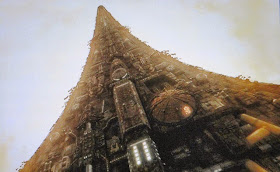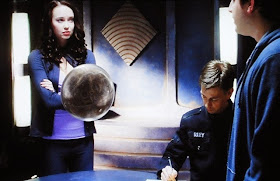"It is spectacular isn't it?"
-The hardened Colonel David Telford in awe of the beauty and vastness of space from an observation platform aboard the Destiny during FTL-




"She can barely follow an episode of Star Trek." -Eli Wallace on his mother not possibly understanding the body switching device that is the Ancient communication stones-
"I'm sorry to have to tell you that we will not be going home. Not yet, anyway. ... The ship will not be exploding at least not today." -Dr. Nicholas Rush, less than interested in returning home and sabotaging an effort to do so by Telford-
"One of the things we wanted to do was infuse more realism into these stories. This isn't escapism. We're actually trying to engage the audience in a way that's not as escapist as the other two series were intended to be. There's still humour and a team, but not everybody's on the same team." -Brad Wright, SciFiNow #40, p.36-




SGU crashes back down to the realism of Earth with its latest story. Utilizing the five communication stones Stargate Universe, Season One, Episode 7, Earth, concentrates on earthbound character connections. For the thinking sci-fi fan, one of our favorite components of science fiction is character and how they respond to adversity. Earth puts a laser-like focus on that aspect of the new series.



The creators, once again, bring in Richard Dean Anderson as a nod to old, long-time Stargate fans made to feel even older with Anderson's old codger-like demeanor. Kidding aside, and Jack O'Neill would be proud of that, it's interesting how this much more serious approach to SGU in some respects doesn't benefit from the Richard Dean Anderson shtick here and doesn't even fit. The O'Neill character is drawn very much from the more fantastic and comic book style of that original SG-1 series and with the new strategy it doesn't feel quite as right. SGU just isn't the same kind of action adventure that SG-1 was and when Anderson lays on comments like "Colonel Carter saved my ass dozens of times using all kinds of wacky science I didn't understand," well, it feels like SG-1 intruding on SGU. It's a minor thing really, but Anderson has a way of inserting himself in the moment because he was such a colorful, unique, strong character and in a way he can take you out of the drama being asserted by the new series. But as fan service goes fan service it's entirely acceptable. I love seeing Anderson myself along with all of his smarmy facial expressions. But it's tough to reel or rein in a powerful character figure like Jack O'Neill within this new slant on the universe. It's not a problem, but the juxtaposition of those two worlds is there and you see it whenever the characters of SG-1 make their appearances. It's a bit like inserting big movie stars into films intended to lure you into a believable premise. It can be a bit jarring.




On the other hand, it's also interesting to see the shoe on the other foot as Everett Young is forced to go toe to toe with the brass position as O'Neill once did and now O'Neill is the brass for a set of new faces. "I spent most of my career looking up to you because you always did the right thing even if it meant disregarding the chain of command." There is simply a different weight and gravity to the players in this franchise over the cheeky sarcasm once spouted by O'Neill.
With Earth, it's made pretty clear that Dr. Nicholas Rush isn't necessarily interested in returning home. "We're not convinced Rush wants to come home." As a scientist, like many scientists, Rush is all about space exploration. One is reminded, for example, of the Dr. Paul Stubbs character from Star Trek: The Next Generation, Season Three, Episode 1, Evolution whereby Stubbs decrees openly, "I would rather die than leave." The same holds true for Rush, but what his motivations are beyond the selfish, and how they will impact the others aboard, positive or negative, are ambiguous and remain up for observation and debate. We've certainly seen a little of both in this sort of Machiavellian genius. And as actions speak louder than words, though there are plenty of those too, Rush appears certainly more of an obstructionist than a solutions man. But he surprises you. Still understanding the motivations behind the actions is difficult.





This Earth episode alternates between the Destiny and more soap operatic earthbound character displays, which are clever, unexpected, interesting and an overall delight. The Earth based stories focus on the communication stones sending Eli Wallace and Chloe Armstrong back to their mothers, while Young visits the wife giving new meaning to long distance love affair. Meanwhile, long shot plans are being implemented by Colonel David Telford who has swapped places with Young, sidelined by O'Neill and command, to attempt a return home for those aboard the Destiny.

Rush relishes the final Machiavellian-like curtain call too. "I also arranged for the alarms and warnings to go off regardless, a bit of theatre - always nice."

On the scoring front, I've said it before and I say it here once again, and that is that the accompanying compositions by Joel Goldsmith continue to positively wow and really paint an epic, sweeping picture with its sound. To illustrate that point, recently, I had to decide between purchasing the second volume of The X-Files by Mark Snow or the assorted compositions of Star Trek: The Next Generation Collection Volume One, both limited editions available from La La Land Records. Hard earned dollars are tough to come by as most of us know. Following a listen of a few samples from both scores, it was an easy call. Mark Snow won the purchase from me. As much as I love Dennis McCarthy and the scoring for ST:TNG those selections feel awfully apropos when exclusively viewing the series. I simply couldn't see myself listening to that score as entertainment. Mark Snow's selections are killer. My final point being, if the score to SGU was actually available it would have superseded both McCarthy and Snow. It's not only an accompanying masterpiece to science fiction television but as a work of art to be listened to on its very own, it would be an immersive experience. Someone should do the late composer justice and release it already.


Visually, in keeping with the thematic spirit of the episode as characters are caught between the Destiny and Earth, the photographic approach taken to the shooting of the entry includes a wonderful selection of blue and green lighting where applicable. SGU has been meticulous in the coloring of its beautifully photographed series. Much of the feel of the episode, in step with the series' detailed and studied approach benefits here from director Ernest Dickerson of The Wire and The Walking Dead acclaim as well as Dexter. Once again, the creators lend further evidence their approach was based more on gritty efforts like The Shield and The Wire as much as it might have been Battlestar Galactica. Heck, I see a bit of Star Trek: Enterprise in there, but we could go on all day. Despite the comforting tone of its title, Earth, these space farers are a long, long way from home, with some nifty technology, but very much exploring new frontiers in the best ways once established by Star Trek and more so the denizens of Moonbase Alpha in Space:1999.

Earth may not be SGU at its compelling best, but there are more than a few disturbing surprises and conclusions here. The character twists and turns end in a twisted turn as the crew of the Destiny is still learning the ins and outs of the communication stones and the ship herself. There is exceptional ebb and flow to the pacing of SGU too that makes it undeniably sensational, solid science fiction. Earth may take some aboard the Destiny home for a visit, but it is a sobering reminder they are a long way from it and their destiny in space is lies squarely in the discomfort of the unknown.

Earth: B.
Writer: Brad Wright, Robert C. Cooper and Martin Gero.
Director: Ernest Dickerson.
As I continue my own inner psychological struggle to get back to writing, and that war rages on, I did find enough inspiration to get this entry completed. Who knows? Maybe that's what it will take.












































Great to see you back, G!
ReplyDeleteThanks M! Feels good. You're the man!
ReplyDeleteI'm glad that you're back writing about SGU again. Having O'Neill on SGU is a tricky situation. I'm glad that it happened since I got to see Richard Dean Anderson again as the character, but it was off-putting at times. The shows are so different, but Anderson can sell the seriousness of the situation. On the other hand, he can't help but change the tone with his presence.
ReplyDeleteLoved your comment Dan.
ReplyDeleteWell said. It's "tricky"
Like you, love seeing him in it.
I'm glad they do it anyway.
But as you say, the shows are different very much in tone.
No winks and nudges like the other shows.
But Anderson indeed plays it straight. And another point you make that complements what I was trying to convey is that his very presence has an effect.
Anyway just observational fun stuff to write about there rather than regurgitate the plot.
Thank you as always Dan